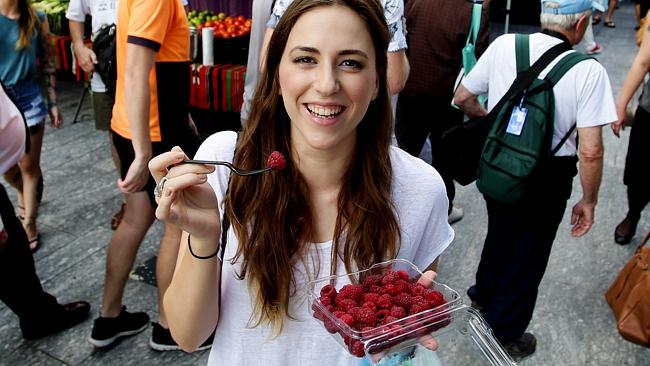NEARLY 200 imported foods bound for Australian supermarkets in the past six months contained contaminants that cause miscarriages, cholera and other harmful effects.
And 83 of those were already released for sale by the time authorities realised they’d failed food safety tests.
Fourteen cases of listeria, which threatens pregnant women and the elderly, five shipments of prawns with a cholera-causing organism and E.coli in seven shipments of cheese already cleared for sale were among the most concerning finds in a Courier-Mail analysis of food testing.
Seafood, cheeses, nuts, sports dietary supplements, ketchup, goji berries, coconut oil and satay sauce were among foods that failed testing as they came ashore from July to December last year.
Some 104 foods that failed in high-risk categories including deli meats, seafood, nuts, cheese and some spices were destroyed or sent back. That included all discovered cases of listeria, vibrio cholerae and salmonella.

Grace Coffey of Paddington with her fresh raspberrys at the Jan Powers Farmers Markets in the city. Pic: Mark Calleja
Food in the low-risk category was released for sale before test results were known. That meant that 83 foods, including cheese with E.coli, prawns containing banned antibiotics and vegetables with banned insecticides, were all potentially on shelves before warning bells rang.
The Department of Agriculture, which provided the statistics, last night could not say how many foods had been recalled after fails came back.
“We notify the relevant state food authority who will make a decision about the level of risk that the failure represents and decide whether or not to initiate a recall,” it said in a statement.
Most importers voluntarily hold food shipments until the test results are known but the department’s own website says test and release food “can be distributed for sale before test results have been received”, which takes 10 days.
Histamine – found in improperly refrigerated seafood and thought to have killed a Brisbane mother and daughter in Bali last year – was picked up 10 times.

Contaminated foods bound for our supermarkets. Source: Supplied
Seafood from Thailand, Indonesia and China had E.coli and listeria was found in Italian prosciutto, Dutch and Italian cheese, and salmon from Norway.
University of Queensland School Of Agriculture and Food Science academic Mark Turner described the cases of listeria, E.coli and salmonella as “pretty abundant” and “at pretty high levels”.
University of Queensland school of agriculture and food science Associate Professor Mark Turner described the cases of listeria, E.coli and salmonella as “pretty abundant” and “at pretty high levels”.
“Things like listeria are very nasty, it can kill people and cause miscarriages and premature births and all sorts of stuff,” he said.
“And you don’t see much cholera (in Australia), it’s more in developing countries … the sewage gets in the waterways and it gets in the food.”
Other antibiotics and chemicals that had been picked up would also be of great to concern to people prone to allergic reactions, he said.
But he said contamination did also happen in Australia-made food.
Stop the berries: suspect berries stopped at the border 1:51
PM Tony Abbott tells Question Time that all frozen berries are being ‘stopped at the border’, after overseas produced berries were linked to Hepatitis A.
- News Corp Australia
- in a few seconds
- News/Politics
The analysis comes as Industry Minister Ian Macfarlane revealed the Government was investigating claims that food from certain countries had levels of lead and arsenic way over legal limits.
Mr Macfarlane yesterday confirmed the testing regimen was being looked into, including ideas that goods from certain countries or regions known to be risky were subjected to a greater intensity of testing.
Federal MPs in Parliament this week have complained testing does not focus on countries with known pollution problems, like China, which is the centre of the Hepatitis A berry saga.
Wary shoppers give fresh life to farmers’ markets
FARMERS’ markets have seen a surge in sales as wary shoppers turn away from frozen and imported products in the wake of the hepatitis A outbreak.
Rocklea’s Brisbane MarketPlace’s Alison Campbell said sales of berries had picked up and produce sales have been stronger than usual for this time of year.
“When something like that happens shoppers start evaluating their priorities and make the time to go and source the fresh produce so we did expect a bit of an influx,” Ms Campbell said.
“People come here for the produce quality and I think the biggest thing for them is knowing it is Australian and it’s sourced locally.”
Wholesaler Noel Joliffe, who supplies berries and other produce to the hospitality industry, has also had a boost in sales since the spotlight has been on the dangers of imported food.
“It definitely has, they’ve seen all this stuff on the news and if they weren’t buying off me before, they are now. I’ve got new customers.”
Paddington’s Grace Coffey, 23, sourced local produce at Jan Powers Farmers Markets yesterday. “After hearing about the hepatitis A outbreak I’m sceptical of purchasing any of those (frozen) foods now. I like to know where my food’s coming from and support the farmers too
